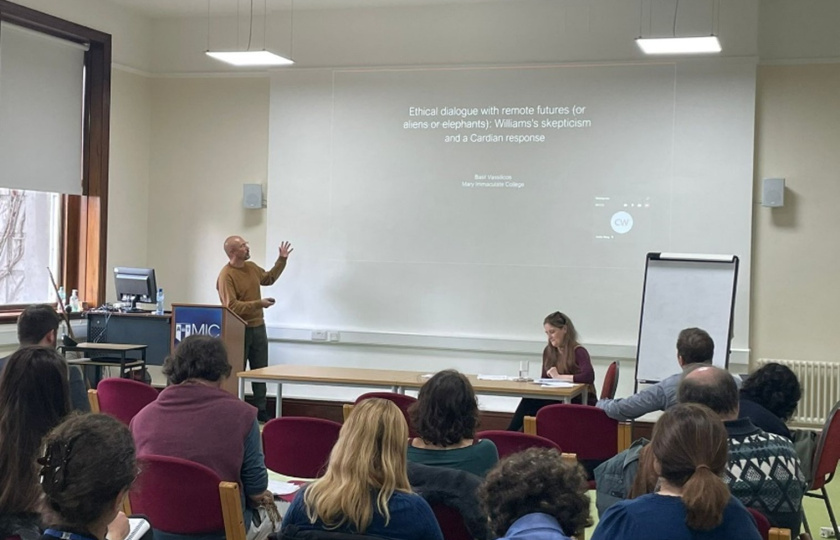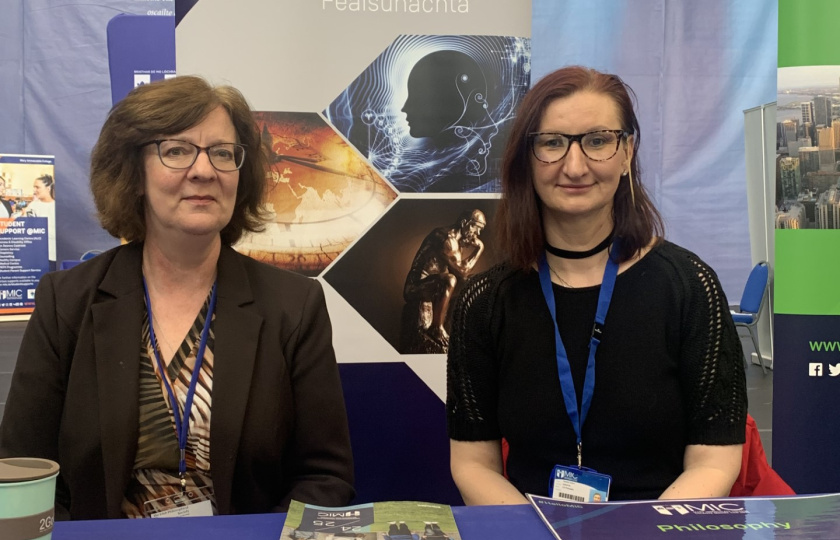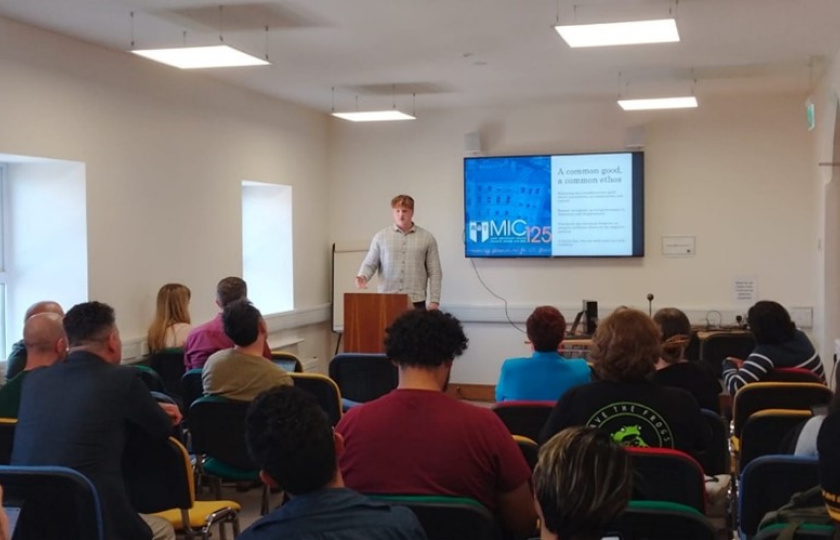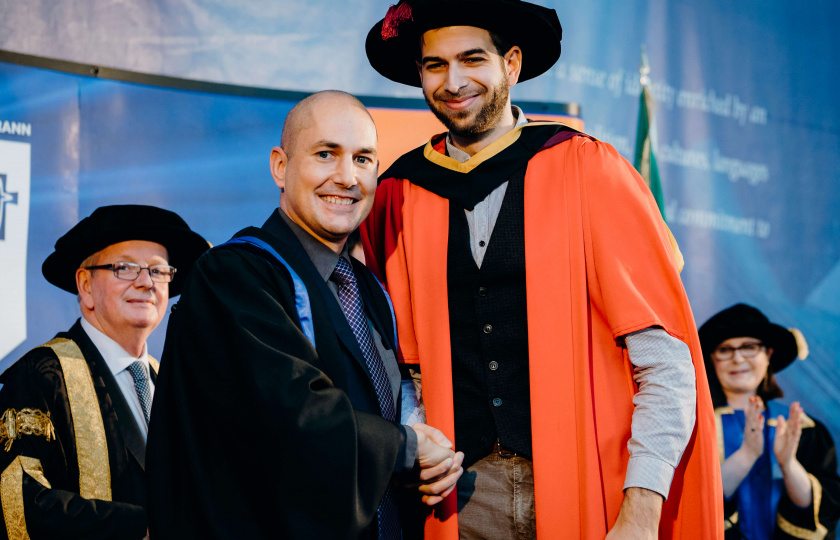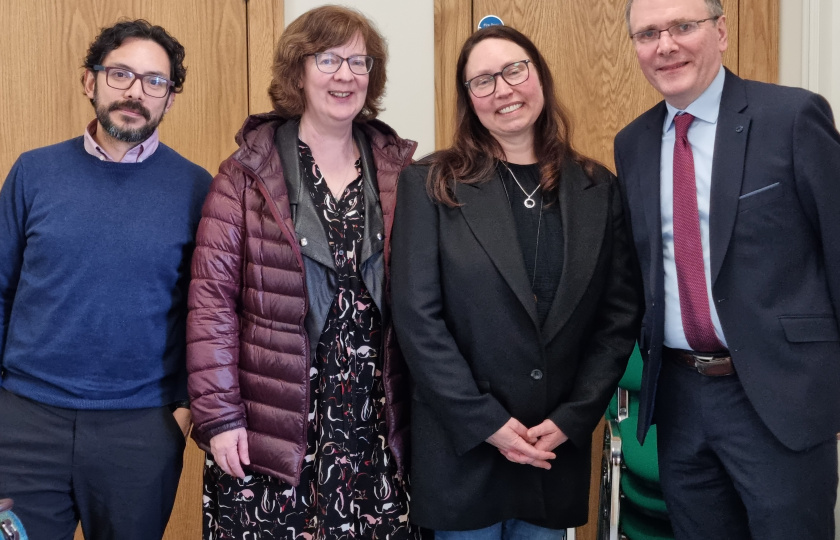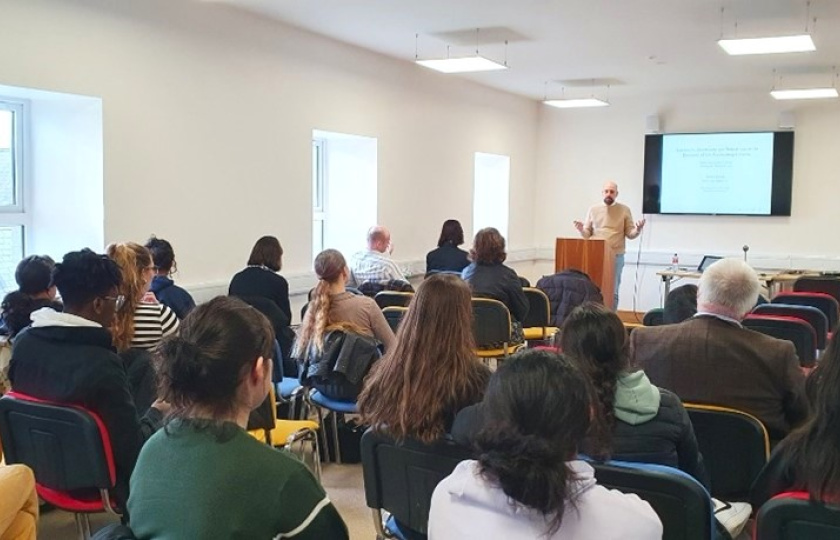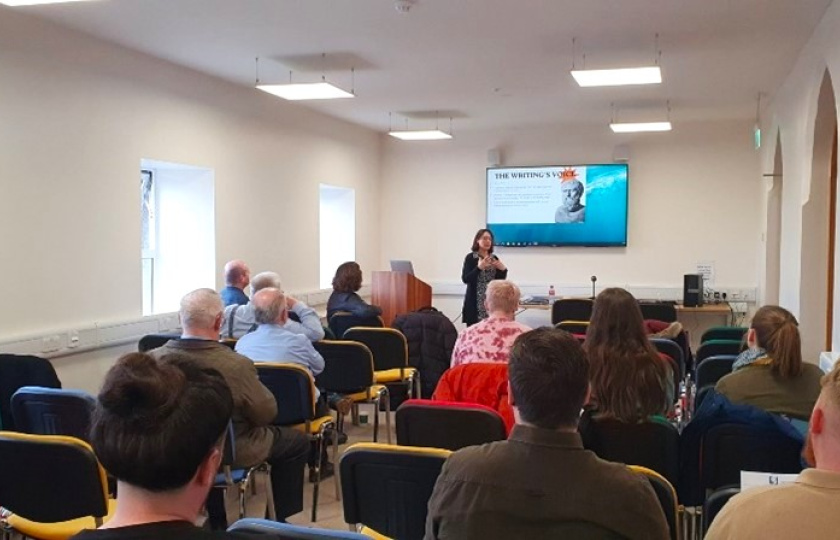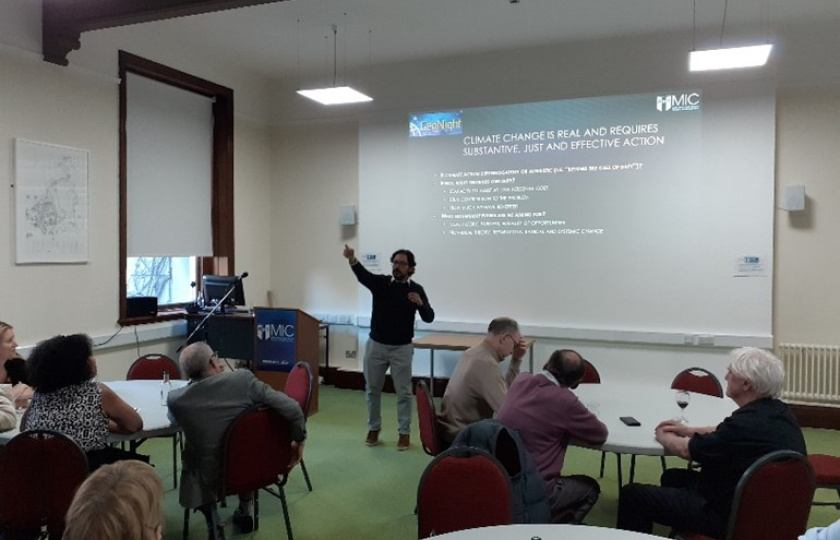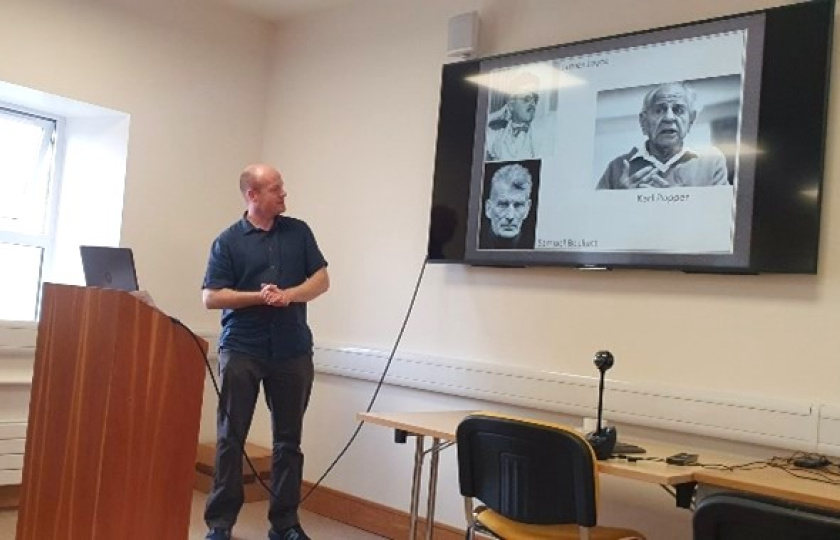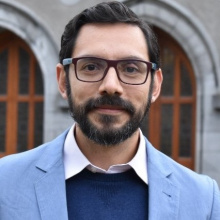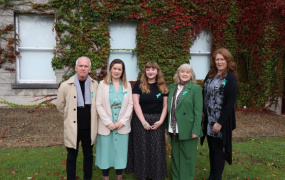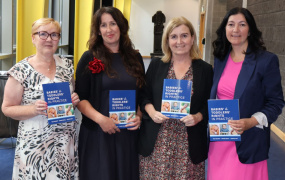Philosophy
About
The Department offers undergraduate (joint honours) and graduate programmes in philosophy (research MA, research PhD).
We enjoy an excellent teaching record, and we have research strengths in Ancient Greek, Roman and Medieval Philosophy, Philosophy of Religion, Ethics, Phenomenology, and Philosophy of Emotions.
The Department also contributes to the MA in Climate, Justice and Sustainability and the Pre University Programme. It also oversees the philosophy modules in short-term international programmes in collaboration with the International Office.
Undergraduate programme
Our undergraduate degree programme consists of a broad, accessible, and solid initiation to Philosophy. The following are our modules on the Bachelor of Arts programme, in descending order from First Year onwards:
This module offers an accessible introduction to some of philosophy's most fundamental and hotly debated topics. It provides students with the skills and historical and conceptual background necessary to access, understand and engage with core debates in ethics, social justice, knowledge and unjustified belief, existence, and topics in the philosophy of mind, language, and religion.
Questions discussed in this module include: What is justice? Can we achieve it for all? What is, if any, the goal of our life? How can we explain the difference between science and pseudo-science? What is the philosophical foundation of human rights? The module will also include philosophical debates and moral dilemmas about immigration, emotions, alternative facts, racism, consent, and criminal justice.
The module emphasises developing critical thinking through the analysis of arguments and concepts, evaluation of competing interpretations, and discussion of objections, counterarguments and competing evidence. It also aims to develop precise, efficient, and coherent academic writing and oral communication skills.
This module begins by tracing the roots of Western culture's shared views and ideas about love and desire. The historical moments considered are Classical Greek and Roman, Medieval, and Modern Philosophy. In this section, we will study the concepts of Eros (erotic love), Pietas (affection), Philia (friendship), the education of desire in Stoicism, and Divine Love in Medieval Philosophy. The second part of the module focuses on contemporary philosophical debates. We will discuss puzzles about the definition of love, socialisation and romantic love, the value of personal relationships, and the ethics of caring for others. The module closes with a section on non-western approaches to love and desire.
In this module, we will consider the foundation of Ethics as a philosophical discipline, beginning with its origins in the civic and practical speculation of Plato and the theory of Aristotle, who gives it a scientific structure. We will then move on to key variations on that, critically appraising each theory. Key writers are Aristotle (Weeks1-3), Kant (Week 4), and J. S. Mill (Week 5) in terms of historical origins; notable contemporary writers include Elizabeth Anscombe, Roger Scruton, Philippa Foot, Mary Midgley and Alasdair McIntyre (Weeks 6-10). Finally, we will examine some issues in current ethical discourse (Weeks 11-12 – Lumet, McIntyre), using what we have studied to think about them.
Do you have good reasons to believe what you believe and justify your decisions and actions? How do you know? What if you are mistaken or have been misled? Would you be able to change your mind? Maybe someone else got things wrong. Can you prove it and communicate it persuasively?
We live in a world saturated with answers to our questions, solutions to our problems, and ideas that promise to transform our personal and professional lives. However, how can we assess whether the information is trustworthy? This module will introduce students to critical thinking, understood as a set of skills, values and attitudes which comprise argumentation theory and techniques (including basic logic, identification of fallacies and common cognitive biases), rhetoric (i.e. the art of persuasion), the role of background knowledge in the assessment of theories and hypothesis, and an appreciation of the value of truth, and epistemic virtues like open-mindedness, curiosity, and intellectual humility, perseverance and courage. The module will help develop interpretative skills, perspective-taking, problem-solving, formulating better questions, decision-making and the practice of reading texts charitably to extract arguments and ideas, identify hidden and background assumptions, inaccurate claims and how to infer information correctly.
Introduction to Political Philosophy
In this course, students will analyse the concepts, arguments, and positions articulated by political philosophers, taking note of and weighing for ourselves their divergent perspectives, and considering where your own ideas and experiences may contribute to them. Some of the questions addressed are the following: What are communities? How are citizens formed and how should they be educated? What are the rights and obligations of citizens and from what do they stem? How should societies be organised? What should be the spaces for, goals of, and obligations for civic participation? Who is the global citizen, if one exists, and what is their role and function in society?
How should postcolonial communities move on, but also live with the past? What is environmental justice and how can we make sure it applies to everyone? Does something like intergenerational justice exist and what is it based upon? Such questions have a long history. Here, we will hope not to solve them but to gain a deeper understanding of their complexity. We will reach such an understanding through careful reading and discussion of key texts, but also by looking outside the classroom for experiences and cases that will enrich our dialogue about the central issues in political philosophy.
This module introduces and explores selected topics in five ancient philosophical traditions: African, Greek, Roman, Indian, and Chinese. This includes an exploration of prehistoric African and Egyptian philosophy, Classical Greek philosophy, the contributions of the Roman Stoics, Sceptics, and Neoplatonic philosophers who lived under Roman rule, as well as an introduction to the Upaniṣads, Buddhist thought and Jain philosophy.
The module will close with an introduction to the philosophy of the Dao and early Confucianism. Students will learn the sociocultural and historical context that gave rise to these philosophies and study and critically engage with selected themes, texts and arguments in ethics, political philosophy, epistemology, and metaphysics.
BA students follow the Off-Campus Programme for both semesters of the third year. This is comprised of international study placement and/or relevant work placement. Philosophy students who wish to study abroad are advised by department staff on the availability of appropriate courses. Guidance is also provided for those who wish to use the opportunity to begin research work for final year projects in Philosophy.
The aim in this course is twofold: to cover both historical and contemporary philosophical conceptions of science and technology, and to cover and problematise the relation of philosophy to science and technology.
This module focuses on a core area of contemporary philosophy, namely, concerning questions about the nature of the mind or mental phenomena. Some key questions that will be discussed are the following: what is experience, and why is it important? What problems does consciousness raise for both philosophers and other scientists? What are emotions and affects, and what is their relation to desires and values? What is it like to live with and encounter other persons or living beings in our lives? How is interpersonal experience and understanding of others to be conceptualized? In this course, students will become familiar with a broad swath of literature, drawn from both contemporary ‘philosophy of mind’ and ‘phenomenology.’ While the boundaries between the two are sometimes blurry, in exploring a bit of both, students will be introduced to some of the major philosophical issues concerning ‘the mind’ and will be encouraged to question them for themselves. This module thereby furnishes an in-depth exploration of the nature of the mind, primarily examined through the lens of our own human experiences and what these disclose about the many facets, questions, and paradoxes of our mental and embodied lives.
The course falls into two parts: the first focuses on evidence for the existence of God and seeks to understand His relationship with the world; the second deals with the nature of religion as a fundamental human phenomenon. The first part of the course will consider contemporary accounts of the origins of life and the universe; metaphysics and the question of origins; the intelligibility of the universe; randomness and order; the structure of intelligence and the structure of being; the act of unrestricted understanding; Persons and Eternal Thou; personal being; interpersonal relationships and their ground; faith and fidelity; suffering and hope.
Introduction to the Philosophy of Art and Aesthetics
This course introduces students to the philosophy of aesthetics and art. This can be broadly defined as the study of, on the one hand, the nature of the beauty, the sublime, the ugly, and the ‘cringe,’ and on the other hand, the nature, power, and scope of art and its practices. The development and current state of this field is examined in connection to three important themes: universality, experience, and politics. In the first theme, questions of the universality, necessity, and subjectivity of the aesthetic domain will be explored, both in a historical context and in respect of the contemporary art world. In the second theme, we explore the role of representation, imagination, and mimesis in aesthetics, as well as considering the new possibilities for these capacities explored in the arts of the 20th and 21st centuries. In the third theme, we will consider the impact that aesthetics, via art, may have on the contemporary conceptualisations of sexuality, gender, and embodiment, and how a reverse relation may also be possible.
You can also take some of these modules as BA and BEd electives or as an international Erasmus student.
From the 2024-2025 academic year, BA Year 2 philosophy combinations include:
- Philosophy & Business studies
- Philosophy & Drama & Theatre Studies
- Philosophy & English & Literature
- Philosophy & Gaeilge
- Philosophy & Geography
- Philosophy & History
- Philosophy & Mathematics
- Philosophy & Media & Communication Studies
- Philosophy & Music
- Philosophy & Psychology
- Philosophy & Theology & Religious Studies
During Year 3, BA students can choose to do an off-campus placement or study abroad in one of our Erasmus partners, which include the Université catholique de Louvain, campus Louvain-la-Neuve, and campus Saint-Louis, Bruxelles in Belgium, and Radboud University, located in Nijmegen, the Netherlands.

Postgraduate programmes
The Department invites applications from graduates who wish to pursue postgraduate research programmes in Philosophy to Master's, or Doctoral level. Students with interests in the following areas are particularly encouraged to apply:
- Ancient Greek and Roman Philosophy
- Medieval Philosophy
- Philosophy of Religion
- Ethics
- Phenomenology
- Philosophy of Emotions.
You can find all the information on how to apply here.
For available funding, scholarships, and fees information, visit here.
If you studied for your undergraduate degree at MIC, you are also eligible for The President’s Scholarship Awards.
The Research & Graduate School at MIC offers excellent support, training, research funding and facilities.
In collaboration with the Department of Geography, we have recently created the MA in Climate, Justice and Sustainability.
Short-term international programmes
In collaboration with the International Office, the Department of Philosophy oversees the academic delivery of two modules (Ethics and Metaphysics) for the Western European Semester programme developed with St John’s University, New York. These are St John’s University courses offered at MIC.
The module lecturer is Dr. Steven Bond (Steven.Bond@mic.ul.ie).
Subject Overview
Dare to study life’s most fundamental, meaningful, and challenging questions. Become a creative problem-solver, a reflective thinker, and a conscientious leader. Studying philosophy will teach you to think logically and critically about the world we live in, analyse and construct arguments, and be open to new ways of thinking.
Engage with the questions that the greatest minds in human history have grappled with, including perennial problems like:
- What can we know, and how do we know what we know?
- What does it mean to say we are free?
- Can we prove that God exists or not? What are the consequences of our answer to that question?
- What is justice? Can we achieve it for all?
- What sorts of political institutions are best, and why are they needed?
- To what extent are moral values absolute, and to what extent do cultural factors produce them?
- What are our duties and responsibilities to ourselves and others?
And new, pressing, and hotly debated topics, for example:
- How can we achieve racial justice and gender equality?
- What is consciousness?
- Should anger motivate political action?
- How do experiences like emotions or empathy come about? What do they involve, and what do they mean?
- What is the nature of religious experiences?
- What ethical challenges arise with science and technology?
In our programme, you will study, analyse, and examine the most influential works of the ancient Greeks, Medieval and Modern philosophers. In addition, you will engage with the different approaches and traditions in contemporary philosophy.
Come and join our dynamic and intellectually stimulating Department. Our dedicated lecturers will make your time as a Philosophy student as enjoyable and educationally inspiring as possible. The Department provides a supportive and friendly environment with a distinctive range of modules, research, and extra-curricular activities.
Taster Lectures
Dive deeper into the world of big questions! The Department of Philosophy is pleased to present a collection of recorded lectures exploring various philosophical topics.


Staff
Retired staff
Prof. John Hayes
MA; S.T.L. (Aquinas Institute, 1968); Ph.D (Duke University, 1973).
Lecturer (1975-77); Head, Department of Philosophy (1977-2008); Co-ordinating Head, Arts Departments (1991-2007); Dean, Faculty of Arts (2007-2008).
Email: John.Hayes@mic.ul.ie
Prof. John hayes full profile.
Dr Stephen Thorton
Emeritus staff MIC, former HoD Philosophy
Email: Stephen.Thorton@mic.ul.ie
Events
Each year, the Department of Philosophy hosts academic and public lectures.
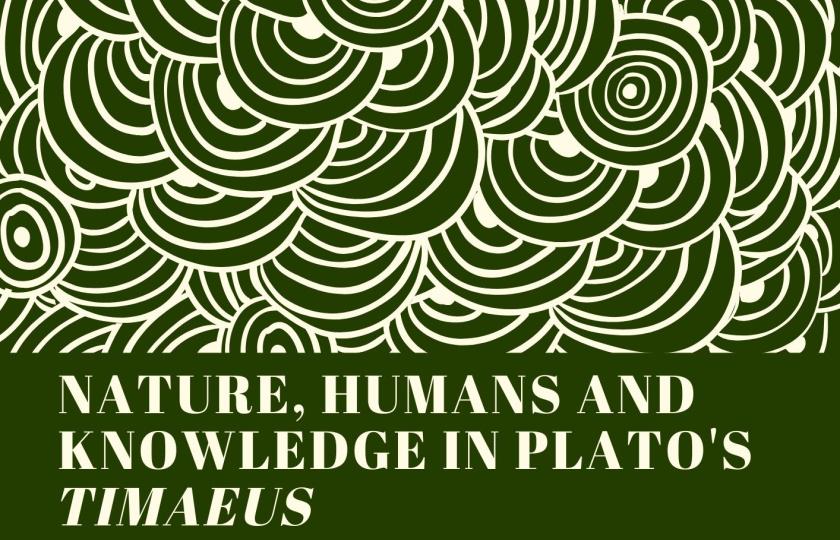
Research Workshop: Nature, Humans and Knowledge in Plato's Timaeus
The Institute for Interdisciplinary and Engaged Philosophy (IIEP), in conjunction with MIC's Department of Philosophy, will host an international workshop on Nature, Humans and Knowledge in Plato's Timaeus on the 18th and 19th of September 2025. The workshop will be held in the Limerick campus in room JHN221 (Newman Building, second floor).
The full programme can be accessed here.
Past Events
Celebrating 60 Years of Philosophy at MIC
The College celebrates 60 years of teaching philosophy. We want to invite our former and current students (in both the Faculty of Arts and Education), Philosophy staff, and friends to an evening of talks and dialogue about the importance and relevance of philosophy in today’s world.
The celebration will take place on Wednesday 12 March, 2025, from 2pm to 6.30pm in room G10 in the Foundation Building, MIC Limerick campus.
- Where: Room G10, Foundation Building, MIC Limerick
- When: 12 March 2025
The event will have no cost for attendees, but we ask that you register your attendance at the link below.
For more information and registration, click here.
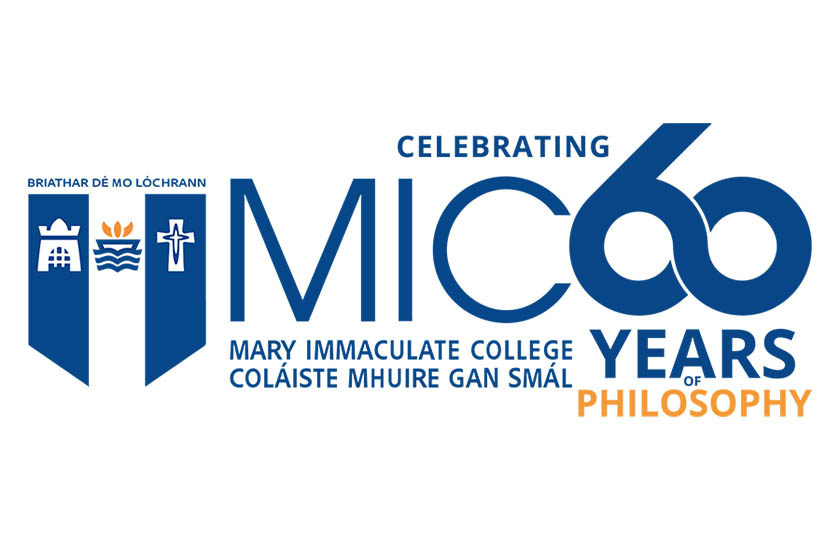
Drury Archive & Minerva Archive

Drury Archive
The Department of Philosophy at Mary Immaculate College, Limerick, was presented with an important and valuable archive when Paul and Luke Drury gifted their father's collection of papers to the College.
Maurice (or Con as he was more commonly referred to) Drury was born in 1907 in Exeter, of Irish parents. He read philosophy in the University of Cambridge where he studied with G. E. Moore, C. D. Broad and Ludwig Wittgenstein.
Drury studied medicine at Trinity College Dublin, graduating in 1939, and worked for most of his life in Saint Patrick's Hospital, Dublin. He maintained a close, lifelong friendship with Wittgenstein; the basis of their friendship appears to have been their common interest in medicine and Psychiatry subjects.
Drury is the author of The Danger of Words (1973) and the articles 'Some Notes on Conversations with Wittgenstein' and 'Conversations with Wittgenstein' (included in Ludwig Wittgenstein: Personal Recollections, edited by Rush Rhees).
Following consultation with the former Dean of Arts at MIC, Prof. John Hayes, Drury's sons, Luke O'Connor Drury, Professor of Astrophysics at the Dublin Institute for Advanced Studies and Paul Drury, Managing Editor, Associated Newspapers, decided to donate their father's papers to the College.
The papers were archived by Jacqui Hayes, Limerick City Archivist, on behalf of the College. Emma O'Connor of MIC library completed the task of imaging the papers electronically, which means that interested researchers who wish to consult the papers in the library can do so without handling the original material.
Intellectual Property
The donated materials shall be made accessible to bona fide scholars for purposes of private study and research only, in accordance with Mary Immaculate College policies. Such scholars will be entitled to publish limited extracts from the material (no more than about 10 per cent of any one document) in line with standard ‘fair usage’ practice and provided there is due attribution of the source. For any more extensive publication, prior permission would have to be sought from the relevant copyright holders (Luke and Paul Drury for the Drury material, the Rush Rhees Archive for the Rhees material).
Full information on how to access the archive is here.
Minerva Archive
For 19 years (1997-2015), the Department of Philosophy at MIC published Minerva, an online open-access journal of Philosophy edited by Dr Stephen Thornton.
The contents of the 19 published volumes of the journal are available here.
Funding
The Department of Philosophy invites applications from outstanding applicants who wish to pursue postgraduate research programmes in Philosophy.
Mary Immaculate College offers a range of MA and PhD funding opportunities, and we would like to highlight the following three funding schemes.
MIC Philosophy Departmental Assistantship + Departmental Bursary
The Department of Philosophy at MIC is accepting applications for one Departmental Assistantship in Philosophy (PhD or MA by research) beginning in September 2025.
Stipend and Fee Waiver
The Departmental Assistantship provides an annual stipend of €6,900 and a fee waiver. The award is renewable for up to three years, with a fee waiver in the fourth year of normal registration.
Assistantship duties
The successful applicant will provide up to 120 hours of tutoring, research assistance, or other departmental work across the academic year to the Department of Philosophy (an average of 5 hours per week per semester and may not exceed 10 hours in any given week). The scheme includes induction sessions, close monitoring and mentoring by the Head of the Department, and training opportunities available to all staff members at MIC.
Additional Departmental Bursaries
The Department will award all Departmental Assistants additional bursaries of €1,550 per semester (i.e. €3100 per annum). The scheme has approved funds for two academic years (2025-2027).
The deadline for applications is on Tuesday, 3rd of June 2025
(Late applications will be welcome if the Departmental Assistantship remains unfulfilled after the deadline; please contact Dr Daniel Vázquez Daniel.Vazquez@mic.ul.ie)
More information about how to apply here.
MIC Doctoral Award
Consists of an annual stipend of €12,600 and a full fee waiver renewable for three years, with a fee waiver in the fourth year of normal registration (College-wide competition).
The closing date for applications is 25 April 2025 at 12 noon.
MIC Studentships Award
Consists of an annual stipend of €6,900 and a full fee waiver renewable for three years, with a fee waiver in the fourth year of normal registration (College-wide competition).
The closing date for applications is 25 April 2025 at 12 noon.
Research
Meet the Researcher
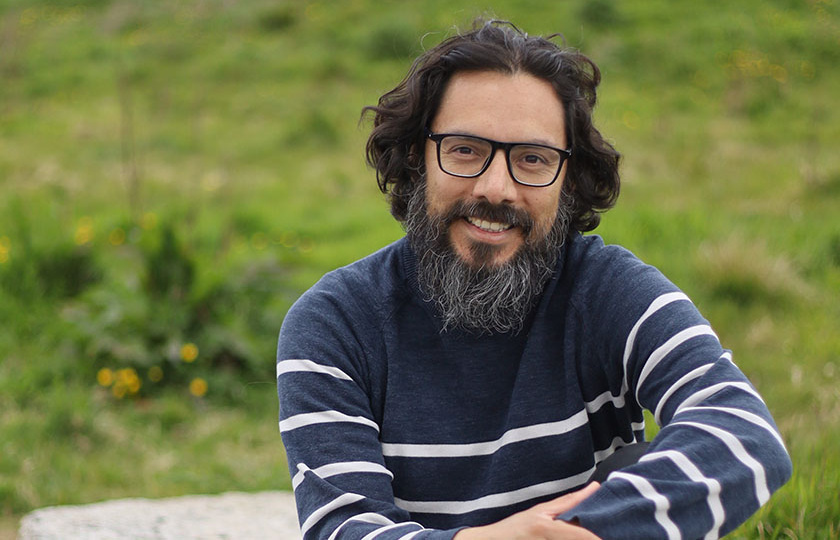
Dr Daniel Vázquez is the Head of the Department of Philosophy at MIC.
Dr Vázquez talks to us about his main area of research in ancient Greek and Roman philosophy. He is currently leading two fascinating projects: the first is about the ethics of arguing for both sides of the same question, and the second examines ancient Greek and Roman ideas about the nature and origin of the universe and their conception of time.
He also tells us what he enjoys most about undertaking research projects and gives sound advice for those considering undertaking research-themed postgraduate study.
I started my studies in Mexico City, where I took two years of a BA in Communications (ITESM) before transferring to the BA in Philosophy (Universidad Panamericana), where I graduated in 2006. I then studied for an MPhil in Philosophy (UNAM), graduating in 2010 with an award-winning dissertation on ancient scepticism. The same year, I moved to the UK to study for my PhD in Philosophy at King’s College London, where I graduated with a dissertation on Plato and the Stoics in 2015. I also hold a Postgraduate Certificate in Academic Practice (PGCAP) in Higher Education from King’s College London (Merit 2014) and am a Fellow of the Higher Education Academy, UK (2017). In addition, I have spent research visiting periods in the Trinity Plato Centre in Dublin (2019-2020), Sapienza University of Rome and ILIESI, CRN (2019), Princeton University (2018), the Department of Philosophy of the University of Oxford (2015-2016), Cornell University (2013), and Yale University (2012).
In 2021 I became the Head of the Department of Philosophy at Mary Immaculate College. Before that, I worked for three years as an ERC Research Fellow based at the Autonomous University of Barcelona (2018-2021), two years as a FAPESP Research Fellow at the University of Sao Paulo (2016-2018), and two years as a College Tutor in Ethics in Oriel College, University of Oxford (2014-2016) and a Lecturer in Ancient Philosophy in the Philosophy Department of the University of Oxford (2014-2015).
My main area of research is ancient Greek and Roman philosophy, from the early Greeks to Late antiquity. I am currently leading two projects. One is about the ethics of arguing for both sides of the same question, a controversial practice developed by Greek intellectuals and philosophers in the 5th and 4th centuries BCE (including Protagoras, Socrates, Plato and Aristotle) and continued during the Hellenistic period by ancient sceptics and dialecticians, but a practice that is still highly relevant today. Allowing space to argue for both sides of a difficult question or case often benefits our understanding, belief formation, risk assessment, and decision-making. However, one might wonder whether discussing both sides of an issue is always morally appropriate. Should we always allow equal time to advocate for both sides? Examples like pseudoscientific theories, political filibusters, and vested interests that manufacture doubt suggest not. But where and under what minimal moral principles should we draw the line? I believe Ancient Greek philosophers can help us develop an ethical framework to answer these questions. This project stems from my previous work on suspension of belief in ancient Greek and Roman philosophy, especially the last chapter of my recent book, Suspension of Belief (Cambridge University Press 2024). It also builds upon much of my work on argumentation and scepticism, recently compiled and translated into Spanish in my book Escepticismo, Metafísica y Argumentación [Scepticism, Metaphysics, and Argumentation] (NUN 2024).
The second project examines ancient Greek and Roman ideas about the nature and origin of the universe and their conception of time. This project is a collaboration with Prof Alberto Ross (Universidad Panamericana, Mexico), where we are particularly interested in Plato and Aristotle, the two most influential philosophers of the classical period of Greek philosophy. This work continues the successful collaboration that resulted in the publication of two co-edited books: Cause and Explanation in Ancient Philosophy (Routledge 2024) and Time and Cosmology in Plato and the Platonic Tradition (Brill 2022).
I like to study ancient Greek and Roman philosophy because it offers an immense treasure. On the one hand, it provides an escape from everyday life and the worries of today’s world. The philosophical problems in these texts are so interesting, abstract, and sometimes so challenging that they make everything around me disappear. Ancient philosophy thus serves as a refuge, a secret hiding place where I retreat to think about fundamental distinctions, arguments and concepts. It is also an escape when I divert my attention from the logic of the arguments to the words in the original language and the grammatical constructions to the historical context and the enormous distance between ancient philosophers and their current readers. I enjoy reading each word and sentence as if I were walking through ancient civilisations’ ruins: learning new things at every step, marveling at what I understand and how much I cannot, and how all these aspects affect my interpretation of philosophical arguments.
However, ancient philosophy also offers a way back to our current life and circumstances. Many of the themes it addresses, the questions it asks, and the theories it proposes are as central today as they were then. For example what counts as knowledge? How should we live our lives? What makes an argument a good argument? What is the fairer political system? On other occasions, even if the specific answers are wrong or we do not agree with them, the methods, the structure of the arguments, and the clarity to analyse the concepts provide masterclasses, models and examples that allow us to return to our lives transformed, with a fresh and sometimes sharper vision of the things around us.
The best part of supervising postgraduate students is witnessing their intellectual flourishing. I enjoy guiding and helping them think deeper and more carefully about their research questions, learning from them and discussing their innovative arguments and contributions to the scholarly debate.
Look for a good match between your research project and the research expertise of your prospective supervisor. Prioritise the importance of studying in a welcoming and academically thriving place with a friendly community of graduate students and a supervisor willing to become your mentor and advocate in the academic world.
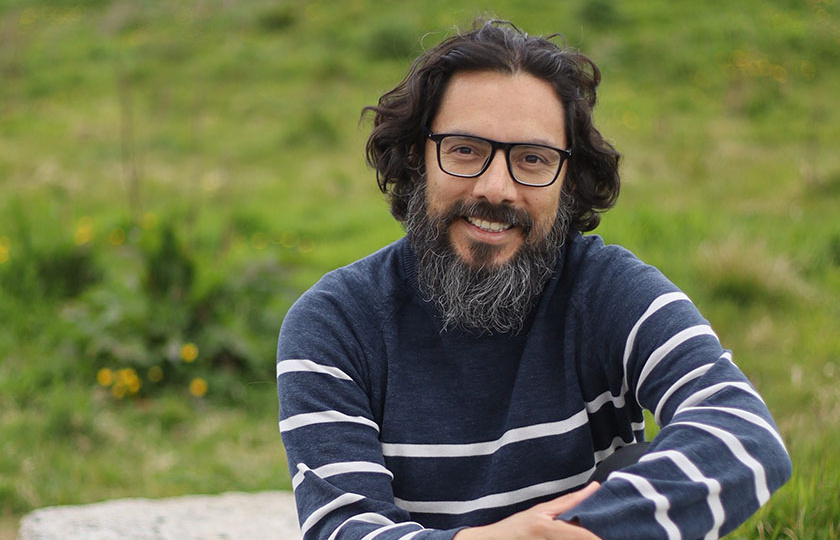
MIC’s Meet the Researcher series focuses on the breadth of research output from MIC academics and student researchers.
Visit MIC Insights- About
- Subject Overview
- Staff
- Events
- Drury Archive & Minerva Archive
- Funding
- Research
- Visit MIC Insights



